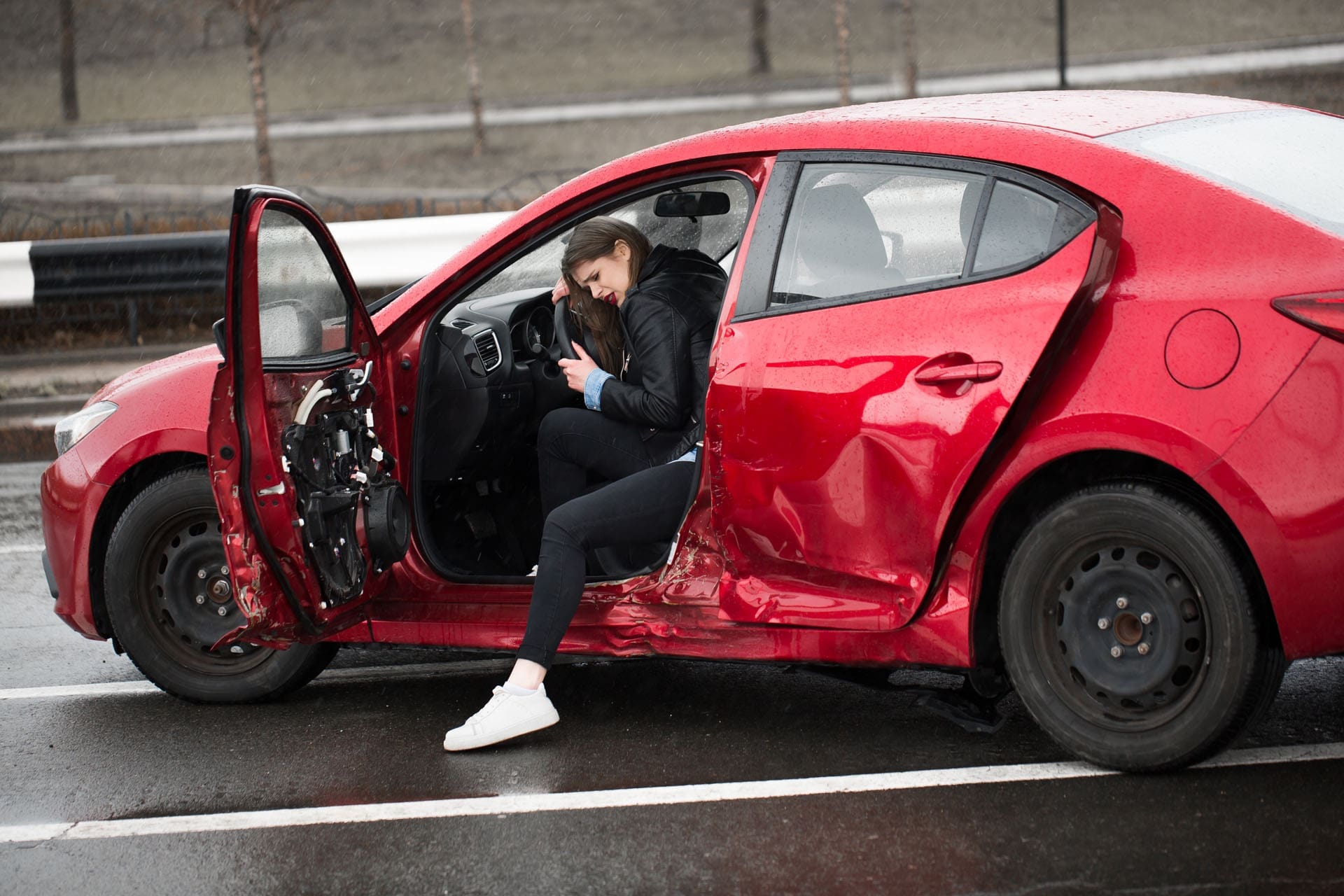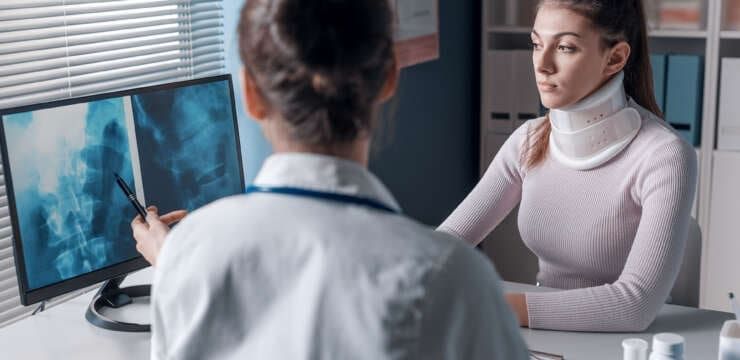
Table of Contents
How Car Accidents Damage Gut Health — And What You Can Do About It

Introduction: Your Gut Could Be the Hidden Injury After a Crash
Most people think of car accident injuries as physical: neck pain, back strain, or broken bones. But what many don’t realize is that the gut often suffers just as much. After a motor vehicle accident (MVA), trauma to the abdomen can disrupt digestion, cause inflammation, and trigger a cascade of gut-brain dysfunction—sometimes without symptoms for hours or even days.
Blunt abdominal force, seatbelt compression, and stress-related inflammation can lead to bloating, cramping, diarrhea, or long-term digestive problems. These symptoms often show up late and may go untreated if patients don’t receive proper care. That’s where functional health coaching, integrative medicine, chiropractic care, and trauma-informed gut recovery protocols come in.
This post explores how MVAs affect the gastrointestinal (GI) system and outlines a holistic, personalized approach to restoring digestive balance after trauma.
[Citations: The Barnes Firm, 2024; Smith & Hassler, 2024; Maguire Law Firm, 2024]
Understanding How Car Accidents Impact the Digestive Tract
During a car crash, your internal organs keep moving—especially the soft, vulnerable structures in the abdomen. Even with a seatbelt, the rapid force of the crash can compress the stomach, intestines, and other digestive organs against the spine or steering wheel. This trauma may be mild (like a bruise) or severe (like a perforation or rupture).
The gastrointestinal system is especially sensitive to trauma because:
- The intestines have a large surface area with fragile tissue
- The spleen and liver are highly vascular and prone to bleeding
- Nerve connections between the spine and gut can be disrupted
- Inflammation from physical injury can trigger immune and digestive issues
Patients often leave the scene feeling fine but later experience pain, tightness, nausea, or irregular bowel movements. Unfortunately, these signs are often ignored or chalked up to stress. But they could be symptoms of serious conditions like seatbelt syndrome, bowel perforation, or internal bleeding.
[Citations: Plaxen & Adler, 2024; Lorfing Law, 2024; ResearchGate, 2022]
Why GI Symptoms Often Show Up Later
Unlike broken bones or lacerations, internal GI damage can take time to manifest. Days or even weeks after the crash, patients may report:
- Cramping or abdominal bloating
- Acid reflux or loss of appetite
- Gas, constipation, or diarrhea
- Sharp stomach pain or soreness
- A hard, distended belly
- Fatigue, fever, or dizziness
These symptoms may indicate inflammation, leaky gut, infection, or organ trauma. And even in milder cases, crash-induced stress alone can shift the nervous system into sympathetic dominance, making it harder for the gut to rest and digest.
Unfortunately, many primary care evaluations skip gut-specific exams or fail to connect the dots between abdominal symptoms and prior trauma. That’s where integrative health coaching and trauma-informed evaluation are critical.
[Citations: Michigan Auto Law, 2024; UpToDate, 2024; BMC Emergency Medicine, 2024]
Seatbelt Syndrome, Splenic Ruptures, and Hidden Gut Trauma
The GI system is vulnerable to both blunt trauma and pressure injuries in a crash. The most common digestive-related injuries from MVAs include:
Seatbelt Syndrome
Seatbelts save lives, but they can also cause:
- Deep bruising across the belly
- Small or large intestine tearing
- Internal bleeding or spinal fractures
Patients with horizontal abdominal bruises should be evaluated immediately for internal injuries.
Splenic and Liver Injuries
These organs can bleed slowly or rupture after impact. Signs include:
- Left shoulder pain
- Dizziness or low blood pressure
- Abdominal tenderness
Bowel Perforation
Small tears in the gut wall can lead to infection, inflammation, and sepsis. Early signs may be mild cramping or bloating, but the risk increases without prompt diagnosis.
Pancreatic Trauma
Though less common, trauma to the pancreas can impair enzyme production and digestion long after the crash.
If these issues aren’t identified early, they may evolve into chronic digestive dysfunction. That’s why functional health teams work closely with trauma-informed providers to explore the whole body’s response to abdominal impact.
[Citations: Maguire Law Firm, 2024; ResearchGate, 2022; PMC, 2011]
The Gut-Brain Axis After Trauma: Chiropractic’s Role in Resetting the System
The gut and the nervous system are deeply connected. The spinal cord communicates with the intestines, liver, stomach, and colon through nerve branches that can become damaged, compressed, or misaligned after a crash.
Chiropractic care helps by:
- Realigning spinal segments affecting thoracic and lumbar nerves (T6–L2)
- Restoring parasympathetic nervous system function (rest-and-digest mode)
- Improving vagal nerve tone, which regulates gut movement
- Reducing inflammation through spinal adjustments
Patients recovering from abdominal trauma often have accompanying back pain or stiffness—signs that spinal and nervous system dysfunction may be affecting digestion. A chiropractor who understands gut-brain dynamics can help restore balance safely and naturally.
[Citations: Chiropractic Scientist, 2024; Dr. Alexander Jimenez, 2024; BMC Emergency Medicine, 2024]
Functional Medicine: Personalized Gut Repair After a Crash
Even after obvious injuries heal, the gut may remain inflamed, sluggish, or sensitive. That’s where functional medicine shines. It identifies how trauma, stress, diet, and lifestyle have disrupted the gastrointestinal environment—and how to rebuild from the inside out.
Common Findings in Post-Crash Patients:
- Leaky gut from trauma or NSAID use
- SIBO (small intestinal bacterial overgrowth) from impaired motility
- Gut microbiome disruption from stress or antibiotics
- Poor digestion linked to nervous system imbalance
- Food sensitivities that developed after inflammation or trauma
Functional Healing Tools Include:
- L-glutamine, zinc, marshmallow root, and aloe to repair intestinal lining
- Targeted probiotics and prebiotics to rebalance flora
- Digestive enzymes to support stomach acid and nutrient absorption
- Trauma-informed coaching to restore emotional-gut connection
- Anti-inflammatory nutrition protocols
Functional medicine also emphasizes lab testing, stool analysis, and micronutrient panels to identify deficiencies or hidden dysfunctions. This empowers patients to participate in their healing and avoid chronic GI conditions.
[Citations: WellnessDoctorRx.com; Dr. Alexander Jimenez, 2024; Maguire Law Firm, 2024]
Acupuncture and Breathwork for GI Restoration
After a car accident, patients are often stuck in fight-or-flight mode. Acupuncture and breathwork reset the nervous system and promote rest, digestion, and healing.
Acupuncture:
- Stimulates the vagus nerve for gut motility
- Calms the sympathetic nervous system
- Reduces abdominal pain and inflammation
- Improves sleep, mood, and energy
Breathwork and Mind-Body Practices:
- Support vagal tone
- Reduce cortisol levels
- Help patients release trauma held in the gut
When paired with coaching, these techniques help patients regain a sense of safety, control, and gut harmony—essential for long-term recovery.
[Citations: BMC Emergency Medicine, 2024; Dr. Alexander Jimenez, 2024; WellnessDoctorRx.com Clinical Practice]
Coaching for Long-Term Gut Health After an MVA
Health coaching isn’t just about food and exercise—it’s about helping patients rebuild trust with their bodies after trauma. For those recovering from car crashes, GI symptoms can feel random, overwhelming, and isolating. A trauma-informed health coach can help patients:
- Understand how their gut symptoms link to the crash
- Create a personalized recovery plan
- Navigate fear, anxiety, and body distrust
- Build sustainable daily routines to support gut healing
- Set boundaries, manage stress, and prioritize rest
When GI health is approached with compassion, science, and coaching, the body often responds quickly. With the right team, recovery is not only possible—it’s empowering.
[Citations: Fletcher Law USA, 2024; Lorfing Law, 2024; Michigan Auto Law, 2024]
Summary: Reclaiming Your Digestive Health After a Crash
Car accidents affect more than your bones and joints. They can alter your digestion, upset your microbiome, and leave you with long-term gut dysfunction. But with the right combination of diagnostics, chiropractic, functional medicine, acupuncture, and coaching, healing is within reach.
Here’s what that path might look like:
- Imaging and labs to rule out bleeding or organ trauma
- Chiropractic adjustments to reset nerve-gut communication
- Functional medicine testing and protocols to repair the GI lining
- Acupuncture and breathwork to regulate the nervous system
- Health coaching to support long-term behavior change
- Legal-medical documentation to protect your rights
If you’re experiencing digestive issues after a car accident—even weeks later—listen to your body. The gut remembers, and with care, it can fully heal.
[Citations: Patterson Personal Injury, 2024; UpToDate, 2024; Dr. Alexander Jimenez, 2024]
References
Barnes Firm. (2024). Delayed stomach pain after a car accident. Retrieved from www.thebarnesfirm.com/delayed-stomach-pain-after-a-car-accident/
BMC Emergency Medicine. (2024). Abdominal trauma in road traffic injuries. Retrieved from bmcemergmed.biomedcentral.com/articles/10.1186/s12873-024-01002-0
Bryant Law Center. (2024). Stomach pain after car accident. Retrieved from www.bryantpsc.com/stomach-pain-after-car-accident/
Chiropractic Scientist. (2024). Clinical research insights. Retrieved from chiropracticscientist.com/
Fletcher Law USA. (2024). Stomach pain after a Texas car accident. Retrieved from www.fletcherlawusa.com/blog/stomach-pain-after-a-texas-car-accident/
Lorfing Law. (2024). Stomach rigid or hard after car accident. Retrieved from lorfinglaw.com/blog/stomach-rigid-hard-after-car-accident-texas/
Maguire Law Firm. (2024). Stomach pain after a car accident. Retrieved from maguirelawfirm.com/stomach-pain-after-a-car-accident/
Michigan Auto Law. (2024). Stomach pain and diarrhea after car accident. Retrieved from www.michiganautolaw.com/personal-injury-lawyer/stomach-pain-diarrhea-after-car-accident/
National Library of Medicine. (2011). Injury Severity Score and abdominal trauma outcomes. Retrieved from www.ncbi.nlm.nih.gov/pmc/articles/PMC3217390/
Patterson Personal Injury. (2024). Pelvic and abdominal injuries in auto accidents. Retrieved from pattersonpersonalinjury.com/common-car-injuries/pelvic-abdominal-injury/
Plaxen Adler Muncy. (2024). Abdominal injuries from vehicle crashes. Retrieved from www.plaxenadler.com/2024/07/16/abdominal-injuries-from-vehicle-crashes/
ResearchGate. (2022). Abdominal injuries in road traffic accidents – Autopsy study. Retrieved from www.researchgate.net/publication/360421866_Abdominal_injuries_in_road_traffic_accidents_-_autopsy_study
Smith & Hassler. (2024). Stomach pain after a car accident. Retrieved from www.smithandhassler.com/articles/stomach-pain-after-car-accident/
UpToDate. (2024). Blunt abdominal trauma in adults: Initial evaluation and management. Retrieved from www.uptodate.com/contents/blunt-abdominal-trauma-in-adults-initial-evaluation-and-management/print
Wellness Doctor RX. (2024). Functional and integrative healing. Retrieved from wellnessdoctorrx.com/
Jimenez, A. (2024). Dr. Alexander Jimenez, DC, APRN, FNP-BC – Clinical insights and trauma-informed care. Retrieved from www.dralexjimenez.com/
Disclaimers
Professional Scope of Practice *
The information herein on "Post Accident Gut Healing After Trauma and Injury" is not intended to replace a one-on-one relationship with a qualified health care professional or licensed physician and is not medical advice. We encourage you to make healthcare decisions based on your research and partnership with a qualified healthcare professional.
Blog Information & Scope Discussions
Welcome to El Paso's wellness blog, where Dr. Alex Jimenez, DC, FNP-C, a board-certified Family Practice Nurse Practitioner (FNP-C) and Chiropractor (DC), presents insights on how our team is dedicated to holistic healing and personalized care. Our practice aligns with evidence-based treatment protocols inspired by integrative medicine principles, similar to those found on dralexjimenez.com, focusing on restoring health naturally for patients of all ages.
Our areas of chiropractic practice include Wellness & Nutrition, Chronic Pain, Personal Injury, Auto Accident Care, Work Injuries, Back Injury, Low Back Pain, Neck Pain, Migraine Headaches, Sports Injuries, Severe Sciatica, Scoliosis, Complex Herniated Discs, Fibromyalgia, Chronic Pain, Complex Injuries, Stress Management, Functional Medicine Treatments, and in-scope care protocols.
Our information scope is limited to chiropractic, musculoskeletal, physical medicine, wellness, contributing etiological viscerosomatic disturbances within clinical presentations, associated somato-visceral reflex clinical dynamics, subluxation complexes, sensitive health issues, and functional medicine articles, topics, and discussions.
We provide and present clinical collaboration with specialists from various disciplines. Each specialist is governed by their professional scope of practice and their jurisdiction of licensure. We use functional health & wellness protocols to treat and support care for the injuries or disorders of the musculoskeletal system.
Our videos, posts, topics, subjects, and insights cover clinical matters, issues, and topics that relate to and directly or indirectly support our clinical scope of practice.*
Our office has reasonably attempted to provide supportive citations and has identified the relevant research studies or studies supporting our posts. We provide copies of supporting research studies available to regulatory boards and the public upon request.
We understand that we cover matters that require an additional explanation of how they may assist in a particular care plan or treatment protocol; therefore, to discuss the subject matter above further, please feel free to ask Dr. Alex Jimenez, DC, APRN, FNP-BC, or contact us at 915-850-0900.
We are here to help you and your family.
Blessings
Dr. Alex Jimenez DC, MSACP, APRN, FNP-BC*, CCST, IFMCP, CFMP, ATN
email: coach@elpasofunctionalmedicine.com
Licensed as a Doctor of Chiropractic (DC) in Texas & New Mexico*
Texas DC License # TX5807
New Mexico DC License # NM-DC2182
Licensed as a Registered Nurse (RN*) in Texas & Multistate
Texas RN License # 1191402
ANCC FNP-BC: Board Certified Nurse Practitioner*
Compact Status: Multi-State License: Authorized to Practice in 40 States*
Graduate with Honors: ICHS: MSN-FNP (Family Nurse Practitioner Program)
Degree Granted. Master's in Family Practice MSN Diploma (Cum Laude)
Dr. Alex Jimenez, DC, APRN, FNP-BC*, CFMP, IFMCP, ATN, CCST
My Digital Business Card





